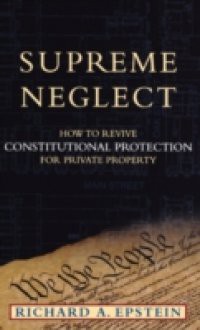As far back as the Magna Carta in 1215, the right of private property was seen as a bulwark of the individual against the arbitrary power of the state. Indeed, common-law tradition holds that property is the guardian of every other right. And yet, for most of the last seventy years, property rights had few staunch supporters in America. This latest addition to Oxfords Inalienable Rights series provides a succinct, pointed look at property rights in America--how they came to be, how they have evolved, and why they should once again be a mainstay of the law. Richard A. Epstein, the nations preeminent authority on the subject, examines all aspects of private property--from real estate to air rights to intellectual property. He takes the reader from the strongly protective property rights advocated by the framers of the Constitution through to the weak property rights supported by Progressive and liberal politicians of the twentieth century and finally to our own time, which has seen a renewed appreciation of property rights in the aftermath of the Supreme Courts landmark Kelo v. New London decision in 2005. The authors own powerful defense of property rights threads through the narrative. Using both political theory and economic analysis, Epstein argues that above all that private property is a sound social institution, and not just an excuse for selfishness and greed. Only a system of private property lets people form and raise families, organize religious and other charitable organizations, and earn a living through honest labor. Supreme Neglect offers a compact, incisive look at this hotly contested constitutional right, championing property rights as an essential social institution.



 8.33 (3)
8.33 (3) 














